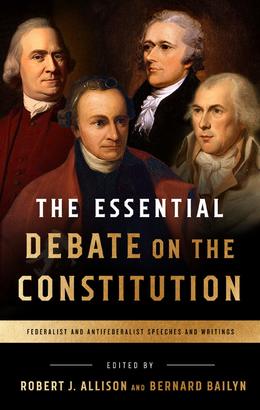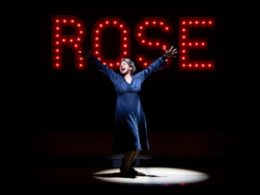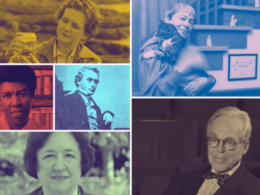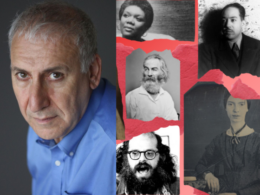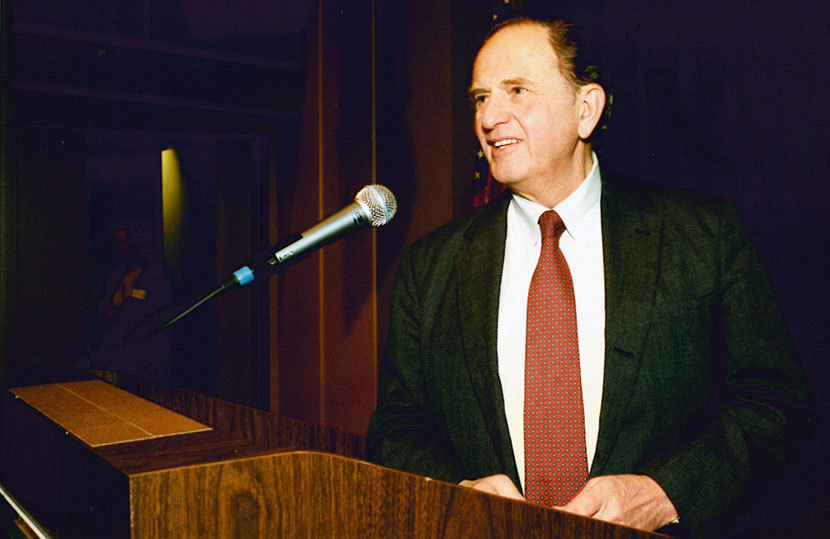
This summer we noted with sadness the passing of historian Bernard Bailyn at the age of 97. In obituaries in the New York Times, the Washington Post, and elsewhere, Bailyn was remembered as a pathbreaking scholar whose insights transformed our understanding of the American Revolution and the early modern Atlantic world, among other topics, as a gifted stylist, and as a teacher and mentor who molded generations of students.
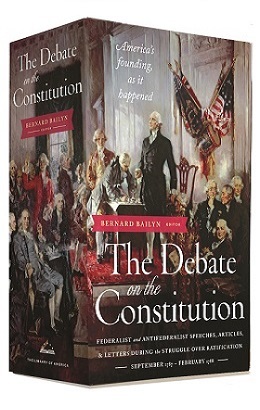 |
| The Debate on the Constitution (two-volume boxed set) |
For us at Library of America, he was also a trusted friend and advisor and a collaborator on one of the most ambitious publishing projects in our nearly forty-year history: the two-volume set The Debate on the Constitution: Federalist and Antifederalist Speeches, Articles, & Letters During the Struggle over Ratification. This massive collection—it runs to almost 2,400 pages—was published in 1993 and now has more than 120,000 copies in print, making it among the most popular editions in the Library of America series. As such, it affirms Bailyn’s conviction, as he once expressed it, that “history is not an esoteric subject, the preserve of scholarly mandarins. It is, or should be, public knowledge, and the broader, the more popular the audience for accurate history, the better.”
To celebrate Bailyn’s extraordinary career and lasting influence, we reached out to three historians who knew him as a teacher and a friend: Gordon S. Wood, Richard D. Brown, and Robert J. Allison. Wood is Alva O. Way Professor of History Emeritus at Brown University, author of the Pulitzer Prize–winning The Radicalism of the American Revolution, and editor, for Library of America, of a three-volume edition of John Adams’s writings and a two-volume edition of pamphlets from the American Revolution. Brown is Board of Trustees Distinguished Professor of History Emeritus at the University of Connecticut and the author of numerous works, including Self-Evident Truths: Contesting Equal Rights from the Revolution to the Civil War. Allison is professor of history at Suffolk University and a teacher at the Harvard Extension School. In 2018 he co-edited one of Bailyn’s final published works, The Essential Debate on the Constitution, a one-volume paperback compendium of the 1993 Library of America edition. We asked each of them to reflect on Bailyn’s legacy as a scholar, writer, teacher, and editor.
Library of America: Bernard Bailyn published more than a dozen books over the course of his career, on what appears in our specialized age a remarkable range of topics, from seventeenth-century Massachusetts merchants to the history of education, from the ideology of revolution to the courses and contours of trans-Atlantic migration. How would you assess his legacy as a historian, both as a researcher and as a theorist? What do you think accounts for the breadth and scope of his work?
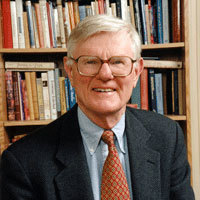
Gordon S. Wood: In a lecture entitled “History and the Creative Imagination,” Bailyn once defined the modern creative historian as someone who has enriched “a whole area of historical investigation by redirecting it from established channels into new directions, unexplored directions, so that what was once dark, vague, or altogether unperceived, is suddenly flooded with light, and the possibilities of a new way of understanding are suddenly revealed.” He selected four twentieth-century historians who he believed had been truly creative in this way—Perry Miller, Charles McLean Andrews, Sir Lewis Namier, and Sir Ronald Syme. In their respective fields each of these scholars, Bailyn observed, made a permanent difference in the writing of history. They did not necessarily write “the most widely read kind of history, the most commonly cited, or even the most generally admired.” What they did write, however, was the kind of history that “permanently shifted the direction of historical inquiry not by exhortation or fashionable trend-setting but by substantive and enduring discovery.” All these creative historians had technical skills, of course, and often great narrative powers, but in the end what really distinguished them, Bailyn felt, was their imaginative power, their “capacity to conceive of a hitherto glimpsed world, or of a world only vaguely and imperfectly seen before.” Not just to define a new issue here or to uncover a new problem there, but to create of the past “a verifiable world of interconnections, of relationships which together add up to a different and better picture of the whole—more comprehensive, deeper, closer to the grain of reality—than had been seen before”—that is the true mark of a great creative historian.
If so, then Bailyn was surely one as well. In fact, Bailyn fully fits his own definition of the modern creative historian. He has made a difference—a permanent difference—in his field of early American history. He transformed every aspect of the subject he touched—from the social basis of colonial politics to early American educational history, from the origins of the American Revolution to early American immigration. Indeed, few if any American historians in the modern era of professional history-writing have ever dominated their particular subject of specialization to the degree that Bailyn dominated early American history.
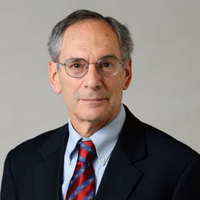
Richard D. Brown: Among Bailyn’s seventy-three doctoral students, understanding of his legacy varies. His curiosity nourished his aggressive pursuit of primary sources, which he read closely, enabling him to reveal layers of meaning others missed. He did not regard himself as a theorist of history. His skepticism toward theory was already evident when he challenged the great French theorist Fernand Braudel in his review of Braudel’s La Méditeranée in 1951. Bailyn did not assign writings on theory in his seminar. In practice, he was an Anglo-American empiricist.
Immersion in sources supplied both questions and answers for Bailyn, who was ever alert to anomalies, believing that unraveling them often supplied historical explanations. In his landmark 1968 book The Ideological Origins of the American Revolution, for example, he recognized that economic and tax burdens, which according to present-day understandings of political motivation explained colonial resistance, were not the central issue for the dozens of pamphleteers opposing Imperial policies. Instead, tax laws and trade regulations signified a broader and deeper threat to colonists’ liberty. Had their fears been based on tax burdens per se, Bailyn reasoned, colonists would have said so. Respecting the sources and their authors was characteristic of Bailyn’s historical approach.
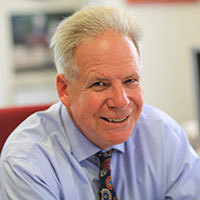
Robert J. Allison: I agree. Bailyn had boundless curiosity. He was genuinely interested in ideas and motivations. And while we look with understandable appreciation at the books and essays Bailyn wrote, like any creative person he also had projects he did not finish or finished in a different way. He spent some years in the 1960s chronicling the political developments in the American colonies, compiling vast databases on the important legislative votes in the various assemblies. This would have been a massive book and, he realized, a worthless and unreadable one. The question he always asked his students—“Who cares?”—is one he always asked himself, too. That massive study thus culminated in a small but potent volume, The Origins of American Politics, delivered as the Colver Lectures at Brown in 1965. Rather than giving us the blow-by-blow account of New Jersey’s budget debates of 1752, he offers a subtle and compelling analysis of how political life changed. And the massive amount of material he had absorbed on the workings of politics, at the same time as he was engaged in the ideas of the Revolutionary struggle, underlay his teaching and writing on the subject.
“No intellectual enterprise is ever wasted,” he said.
LOA: Bailyn won two Pulitzer Prizes and a National Book Award for his books, and if he never quite became a household name like such popular practitioners as Ron Chernow and David McCullough, he reached a large and receptive audience, both among the general public and in the college classroom. How would you characterize Bailyn as a stylist? Do you have a favorite among his books?
Wood: Bailyn’s The Ideological Origins of the American Revolution has stood up amazingly well over the past fifty years, and I believe it remains the most important book ever written about the American Revolution. It opened up entirely new ways of looking at the Revolution that have reverberated throughout both the scholarly and the public worlds over the past half century. Even many of those who criticize or dismiss it have been influenced by it, often without realizing or acknowledging that influence.
What Bailyn discovered in the pamphlets of the Revolution was not just a scattered collection of principles and values but, more important, an elaborate pattern of ideas and beliefs that formed a map of social reality that no historian had quite seen before. Although Bailyn drew on the work of other scholars to create this pattern of ideas, he was the one who put the diffuse parts together.
Brown: Bailyn’s writing was vivid and active. He organized chapters and books to pose and answer questions, rather than provide descriptions. He used adjectives to describe subjects, not the author’s or reader’s response to the subject. In his writing there is both brevity and complexity. He makes arguments with illustrations. Most of all, he was direct and economical. He never wasted the reader’s time with flourishes.
Among Bailyn’s many works, my favorites are those I read earliest in my career: Education in the Forming of American Society (1960) and The Ideological Origins of the American Revolution. Very close to these is The Ordeal of Thomas Hutchinson (1974), one of the two or three best biographies I have ever read. This tour de force reveals a depth of understanding of Hutchinson in the contexts of colonial and British politics that is instructive at many levels.
Allison: My favorite books of his are two later ones: The Barbarous Years, which recounts the stories of African Americans and Native Americans in the Colonial Period. He got a lot of flak for not covering that history in his earlier volumes—in Voyagers to the West and The Peopling of British North America. He begins The Barbarous Years with a long account of the dream-worlds of Native peoples, fascinating work in recovering worlds that are truly lost. We are about two-thirds of the way into this book on colonial America before we get to Plymouth. My other favorite is his last book, Illuminating History, because it is so personal. He avoided writing about himself until this book. It was worth the wait.
(Your mention of McCullough reminds me of the time Bailyn and McCullough were invited to appear on television together with high school students from across the country, who could ask them questions. McCullough was in his own studio elsewhere, and Bailyn and a cameraman, separated by wires and lights and equipment, sat in a studio in Boston, alone with a monitor that would display questions from the students.
After Bailyn answered the first question, the cameraman held up his arms and shook them. Bailyn thought, “He wants me to gesture more.”
So with the next question, Bailyn became more animated, using his arms for emphasis. When he finished the cameraman held up his arms and shook them even more vigorously, pointing to his wrists.
“He really wants me to gesture more.”
The next question, Bailyn became more emphatic, waving his arms even when he did not need to, in order to show how engaged he was.
The cameraman was now shaking his head and waving his arms, pointing to his wrists.
Bailyn took this direction in stride, and as he spoke his arms flayed above and around him.
When the show ended, and Bailyn sat exhausted in his chair, the cameraman crawled under the equipment to Bailyn.
He pointed to Bailyn’s wrist. “You have a laundry tag sticking out of your sleeve.”
“So who knows what these kids saw,” Bailyn said. “Some maniac in a blue suit waving his arms around, with a yellow tag sticking out of his sleeve.”)
LOA: Each of you did your graduate work at Harvard under Bailyn, a famously inventive and (one hears) sometimes intimidating teacher. By all accounts he seems to have been less interested in establishing a school of interpretation than a style of interpretation, indeed he once described the graduate seminar as a “way of sensitizing [students] to various possibilities of explanation and interpretation, and a way also of conveying a sense of taste and style.” How did that work for you? What was your experience like?
Wood: Like others of Bailyn’s graduate students, I arrived at Harvard in 1958 with no intention of working in colonial history. I was prepared to study modern European history or modern American history, perhaps diplomatic history—everything and anything but early American history. I considered the colonial period of American history to be simply a quaint prologue to the main story, an abridged mishmash of myths and folklore with no historical significance.
But I had to take a research seminar, and like other beginning graduate students I sought advice not from the professors but from other graduate students, particularly those only a year ahead of us who were still young and unjaded enough to talk to the graduate students following them. At a Henry Adams Club get-together on the evening before we had to decide our courses, these older, more experienced students enthusiastically advised a group of us to take Bailyn’s seminar. We were skeptical: we had never heard of him and had no interest in colonial history. It was true, they said, that Bailyn was relatively new and young, but he had just gotten tenure and was going to be prominent. But more important than that, these students told us, Bailyn was exciting: his seminar was like no other, and we would learn something about history, not just early American history, but history.
So about a dozen or more of us, all from different places and with different degrees of preparation, signed up. Unlike most of the other seminars given at Harvard, in Bailyn’s seminar we were assigned reading that seemed to have little or no connection to the subject of the seminar, which was colonial politics. We read books on slavery, on colonial cities, on Puritanism; we even read W. B. Weeden’s 1890 volumes on the social and economic history of New England—all the time shaking our heads and wondering what on earth did he want us to read this for. We usually found out in the subsequent seminar discussions, which were always intense. Bailyn had a knack for leading those discussions that is not easily duplicated or even described. At times it seemed little more than his being interested in what each of us was saying and then responding with, “So?” At any rate he forced us to draw out the significance or the lack of significance of each of our statements, and in the process we learned about history. Despite all the history courses I had taken as an undergraduate, I had never really known what the discipline of history was about. Bailyn taught us that. He taught us, without actually saying so in so many words, that historical-mindedness was not merely the accumulation of knowledge about the past but, more important, a mode of understanding, a way of perceiving reality.
Brown: Bailyn’s sheer intellect was intimidating, not the man himself. He was approachable, straightforward, and direct. In Chairman Mao’s phrase, he was happy to see “many flowers blossom.” Sometimes he suggested topics for students to investigate. In my own case, he encouraged me to pursue topics I chose, the confiscation of loyalist estates in seminar, and the Boston Committee of Correspondence for my dissertation. He was a “light” editor of my writing, always encouraging the use of the active rather than the passive voice. But he let me get away with lots of split infinitives.
Allison: For me, Bailyn’s influence goes even further back. It was actually The Ideological Origins of the American Revolution that led me back to college to study history. I had dropped out, and in the early 1980s was working as a cook at the Phoenix Hilton. In my spare time I read a lot, picking up books at a great eclectic bookstore in downtown Phoenix (it stood out because at that time there was not much in downtown Phoenix) and also the Phoenix Public Library’s terrific annual book sale, coming home with piles of books. I was reading all kinds of things that I found by chance—odd volumes of Henry Adams’s History of the United States made me wonder why no one wrote compelling history anymore. Then I found both Pamphlets of the Revolution and a first edition of Ideological Origins. This was exciting—ideas and why they mattered. It led me first to Arizona State, and a great class on the Constitution (it was required for anyone wanting to teach school in Arizona)—and then to the decision to finish college. I made my way to Boston, knowing there were a lot of colleges here where my education could continue; I found the Harvard Extension School, the least expensive college program in the area, and handy since I had a day job in a restaurant. That ultimately led to graduate school, and it was not until I was actually standing in his office that I realized I might actually take a class with Bernard Bailyn. When I finished my Ph.D., under his direction, he was good enough to sign that battered copy of Ideological Origins brought home from the Phoenix Library.
LOA: In addition to his scholarship and teaching. Bailyn was committed to making essential primary texts broadly available for fellow scholars and the general public. How did Bailyn think of the historian’s role beyond the academy? Why was a project like The Debate on the Constitution so important to him? How did Bailyn understand the question of historical relevance?
Wood: Bailyn began his career with a sensitive understanding of the social sciences and their usefulness for history. In this he was obviously indebted to his mentor, Oscar Handlin, whose exciting and engaging deadpan lectures on the whole of American social history we were listening to at the same time we were hearing Bailyn. Bailyn, like Handlin, clearly saw the constructed nature of both personality and society, and in his lectures and writings he sought to untangle the diverse ways by which society and its structures—whether those of family, the economy, or politics—molded men and events. Society was not something given, taken for granted, but problematic, formed, shaped, developed over time. The colonial period was fascinating precisely because it, unlike any other period of American history, saw the creation of society virtually de novo. Perhaps nothing more distinguishes Bailyn from his predecessors than this capacity to conceive of society itself as the central subject of study and analysis.
Bailyn saw that once society was grasped in this sociological way, then a reappraisal of the whole of early American history became possible. But more: the conception by Bailyn (and other historians) that society was the proper subject of historical study saved the colonial period from collapsing into mere antiquarianism.
Brown: Bailyn believed the historian’s social/political role should be to supply a detached view of TRUTH, he believed each generation of scholars should take advantage of their historical distance to understand past events in ways that were concealed from historical actors. The whole point of history was distance, because distance allows detachment. And it was this detachment that enables us to understand people and times different from our own. The historian must analyze and explain, not preach.
Allison: Being Bernard Bailyn’s research assistant on Library of America’s Debate on the Constitution volumes was the most important part of my education as a historian. Watching him work through these documents—trying to discern what each writer or speaker meant, what was his or her frame of reference, how did this fit into the overall discussion—was a hands-on lesson in how to do history. Throughout this process, and again when we did the Essential Debate paperback volume, he never lost sight that this was a political and not an academic debate. He saw the ratification as the culmination of the debate on independence.
I recall he was once interviewed in some newspaper, I think for the twenty-fifth anniversary of Ideological Origins, and he was asked about the “relevance” of the Revolution to “today.” He said that the whole discussion was about power, who held it, why people with power always tried to augment it and abuse it. “If you don’t think that’s relevant,” he said, “you’re not reading the newspaper.”
The New England Quarterly is recognizing Bernard Bailyn’s many contributions to the study of history by establishing an endowed editorship in his honor. The September 2022 issue will feature essays on Bailyn’s many-faceted work by eight of his students; and it will list those who make contributions to fund the editorship. For more information, please send an inquiry to cjedrey@mwe.com.
